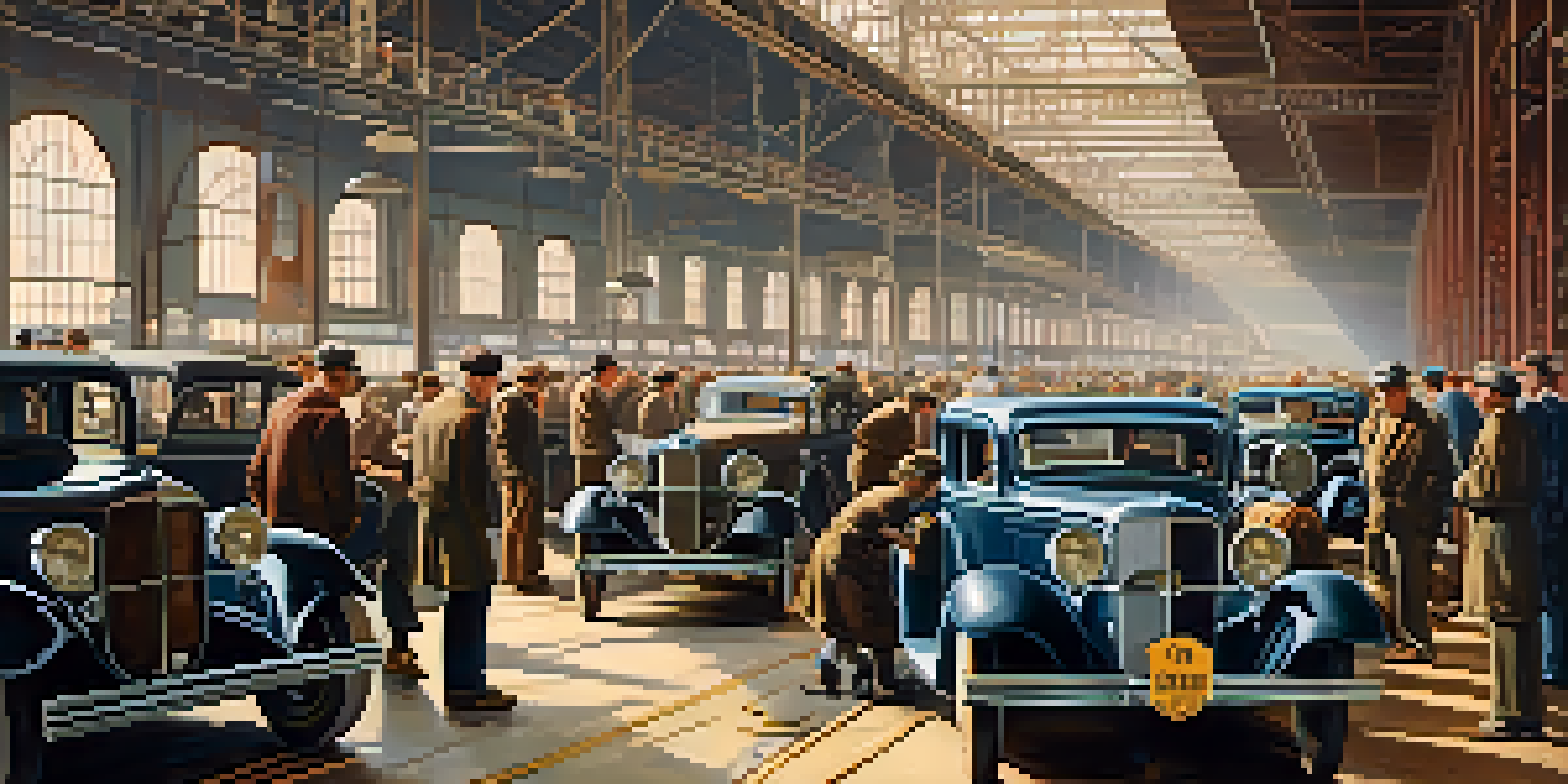The Impact of Automotive Industry on Detroit's Trade Dynamics

The Historical Roots of Detroit's Automotive Industry
Detroit has long been known as the Motor City, a nickname earned through its rich automotive heritage. The industry began to flourish in the early 20th century, with Henry Ford's assembly line revolutionizing car production. This innovation not only made automobiles more affordable but also established Detroit as a manufacturing powerhouse.
The automobile has become a world-wide symbol of freedom, and an expression of individuality.
As automotive giants like General Motors, Ford, and Chrysler set up shop, the city became a hub for skilled labor and technological advancements. The influx of jobs attracted workers from diverse backgrounds, ultimately shaping the city's culture and demographics. This historical context is crucial to understanding the current trade dynamics at play.
Today, the legacy of these early automotive pioneers continues to influence not just Detroit's economy but also its global trade relationships. The interconnectedness of local manufacturing and international markets highlights the importance of the automotive sector in trade discussions.
The Role of Automotive Manufacturing in Trade
Automotive manufacturing is a cornerstone of Detroit's economy, accounting for a significant portion of the city's exports. Cars and automotive parts are among the top products shipped out, making the industry a key player in trade dynamics. This reliance on automotive exports emphasizes the need for a strong manufacturing base to support local and regional economies.

Moreover, the automotive sector's influence extends beyond manufacturing; it impacts service industries, logistics, and even technology. For instance, companies providing software for smart cars or innovative manufacturing techniques are also part of this ecosystem. These connections create a ripple effect, enhancing trade opportunities across various sectors.
Detroit's Automotive Legacy
Detroit's rich automotive history, initiated by pioneers like Henry Ford, has shaped its economy and cultural landscape.
As global demand for vehicles fluctuates, so too does Detroit's trade landscape. Understanding how shifts in the automotive industry impact trade dynamics is essential for local businesses and policymakers, as they navigate these changes to foster economic stability.
Globalization and Its Effects on Detroit's Trade
Globalization has transformed Detroit's automotive industry, allowing local manufacturers to tap into international markets. This expansion has led to a surge in exports, but it also introduces new challenges, such as competition from foreign manufacturers. The dynamic nature of global trade means that Detroit must continuously adapt to maintain its competitive edge.
The future of transportation is electric, and the future of Detroit's automotive industry lies in innovation.
The rise of electric vehicles (EVs) is a prime example of how globalization is reshaping the automotive landscape. As companies pivot towards sustainable practices, they are not only meeting consumer demand but also positioning themselves in the global market. Detroit's manufacturers must embrace this shift to stay relevant and capitalize on new trade opportunities.
In this global context, trade agreements and tariffs play a crucial role. Local businesses must navigate these regulations to effectively compete, which often requires collaboration with policymakers to advocate for favorable conditions. Understanding these intricacies is vital for maintaining Detroit's position in the global automotive industry.
The Impact of Technology on Trade Dynamics
The automotive industry is undergoing a technological revolution, with advancements in automation, artificial intelligence, and connectivity transforming production methods. These innovations not only improve efficiency but also enhance the quality of vehicles produced in Detroit. As technology evolves, so too does the potential for increased trade, allowing for the export of cutting-edge products to global markets.
Additionally, the integration of technology into vehicles has opened new avenues for trade in software and data services. As cars become more connected, the demand for tech solutions increases, creating a thriving market for local startups and established firms alike. This shift illustrates how technology is reshaping Detroit's trade landscape beyond traditional manufacturing.
Technology Drives Trade Growth
Advancements in technology, including automation and connectivity, are transforming production methods and enhancing trade opportunities for Detroit.
However, the rapid pace of technological change also presents challenges. Local manufacturers must invest in research and development to stay competitive, which can strain resources. Balancing innovation with sustainability will be crucial for Detroit to maintain its status as a leader in the automotive industry and a key player in global trade.
Labor Market Changes in the Automotive Sector
The automotive industry has always been a major source of employment in Detroit, but recent changes in labor dynamics are influencing trade as well. With the rise of automation, traditional manufacturing jobs are evolving, leading to a demand for a more skilled workforce. This shift underscores the importance of education and training programs to prepare workers for the future.
Moreover, as companies invest in technology, the need for workers who can operate and maintain advanced machinery becomes critical. This change not only affects local employment rates but also the overall competitiveness of Detroit's automotive sector in the global market. A well-trained workforce is essential to ensure that manufacturers can meet international standards and demands.
The interplay between labor market changes and trade dynamics is significant. As Detroit adapts to new technologies and production methods, local businesses must also engage with broader trade networks to maximize opportunities for growth and development. This adaptability is key to sustaining Detroit's economic health.
Challenges Facing Detroit's Automotive Trade
Despite its strengths, Detroit's automotive trade faces various challenges that can impact its growth and stability. Economic downturns, fluctuating oil prices, and changing consumer preferences can all affect demand for vehicles. These factors create uncertainty for manufacturers and trade partners, making it essential to develop strategies for resilience.
Additionally, the push for sustainability is reshaping the automotive landscape, as consumers increasingly seek environmentally friendly options. This shift requires local manufacturers to innovate and adapt, which can be resource-intensive and complex. Balancing profitability with sustainability goals is a challenge that many companies must navigate.
Navigating Global Trade Challenges
Detroit's automotive sector faces challenges from economic fluctuations, consumer preferences, and geopolitical tensions that require strategic resilience.
Furthermore, geopolitical tensions and trade policies can have a direct impact on Detroit's automotive exports. Tariffs and trade restrictions can create barriers that hinder competitiveness in international markets. Understanding these challenges is critical for local businesses to effectively respond and thrive in a dynamic trade environment.
The Future of Detroit's Automotive Trade Landscape
Looking ahead, the future of Detroit's automotive industry and its trade dynamics will likely be shaped by several key trends. The ongoing shift towards electric vehicles and alternative energy sources presents both challenges and opportunities for local manufacturers. Embracing these changes will be crucial for Detroit to maintain its relevance in the global market.
Moreover, as consumer preferences evolve, companies must be agile and responsive to new demands. This adaptability will not only enhance trade relations but also foster innovation within the industry. Collaboration among local businesses, educational institutions, and government entities will be essential in driving this progress.

Ultimately, the future of Detroit's automotive trade is intertwined with its ability to navigate these emerging trends. By embracing change and prioritizing sustainability and innovation, Detroit can continue to thrive as a leader in the automotive sector, ensuring its place in the global trade landscape.